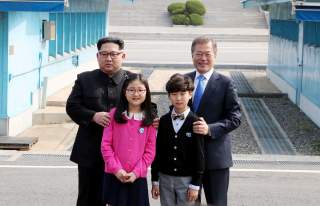North Korea and America’s Second Summit: Here’s What Zhu Feng Thinks Will Happen
"The difference is what Trump wants is more political, while what Kim seeks is more economical."
Editor’s Note: Want more ideas on what will happen at the summit? Check out all 76 expert opinions we gathered here.
The general plan for the second Trump-Kim summit meeting has finally been hammered out between Washington and Pyongyang. It will be held some place in Asia at the end of February. The much expected result is not a new declaration, or handshaking and smiling faces, but an adequate action plan for denuclearization. Thus far, there is little evidence that President Trump’s diplomatic engagement of Kim Jong-un could go that far.
North Korea’s young leader, Kim Jong-un, is obviously demanding a lot before he takes a significant departure towards nuclear disarmament. He wants a declaration ending the Korean War, promised measures for security regime building in the Korea Peninsula, and most importantly, lifting, or at least partial lifting of economic sanctions. It could be almost certain that Kim Jong-un would be more serious than his father concerning denuclearization as Pyongyang’s economic conditions are worse than in his father’s days. On the other hand, he appears to be more confident than his father given Pyongyang’s growing nuclear arsenal and ICBM strike capability. Therefore, giving up part of his nuclear “toys” and even accepting nuclear inspections in exchange for economic aid and lifting of international sanctions, which his reclusive country desperately needs, best serves his interests. In fact, Kim Jong-un greatly needs to strike a deal with President Trump. However, the salami-slicing approach to nuclear disarmament that Kim inherited from his father remains intact. In other words, he will never accept any request for overall and rapid settlement of his nuclear capability. Unless, he can be nicely and consistently awarded by a piece-by-piece nuclear settlement.
Apparently, President Trump has taken phased-out denuclearization for granted. Yes, President Trump’s timeline setting for the phase-out is not endless. He mentioned last June after Singapore summit meeting that two or three years should be an operable timeframe to fulfill denuclearization. That means that he is presumably seeking a nuclear settlement before his second term. Yet, will Kim Jong-un comply with this timetable? Will both sides consent to it? At least, the first summit meeting at Singapore does not offer any signs pointing in that direction.
Sequentially, the second Trump-Kim summit meeting might bring some progress forward by agreeing to officially end the Korean War and allowing humanitarian aid or cooperation with North Korea in exchange for Pyongyang’s promise to demolish its Yongbyon nuclear facilities. Or it could be even better by signaling the young leader would concede to partial nuclear inspections. But all such moves are necessary but not in themselves sufficient to achieve comprehensive, full and verifiable denuclearization.
Perhaps what we will see from the second Trump-Kim summit is a recycling of old story between leaders in Singapore—President Trump remains very confident of his persuasions while Kim Jong-un repeatedly asserts his willingness to fully denuclearize. But the real contest is not exactly about time –framed denuclearization, but about point-to-point hard negotiations. Both Trump and Kim care equally about the “awards” they are achieving. The difference is what Trump wants is more political, while what Kim seeks is more economical.
Zhu Feng, Director of the Institute of International Studies at Nanjing University, writes extensively on East Asian regional security, the North Korea nuclear issue, and U.S.-China military and diplomatic relations. He is author or editor of: “International Relations Theory and East Asian Security” (2007); China’s Ascent: Power, Security, and Future of International Politics (co-edited with Robert S. Ross, 2008); China-Japan Security Cooperation and Defense Communication: the Past, Present, and Future (co-edited with Akiyama Asahiro, 2011); and America, China and the Struggle for the World Order (co-edited with G. John Ikenberry and Wang Jisi, 2015).
Image: Reuters


